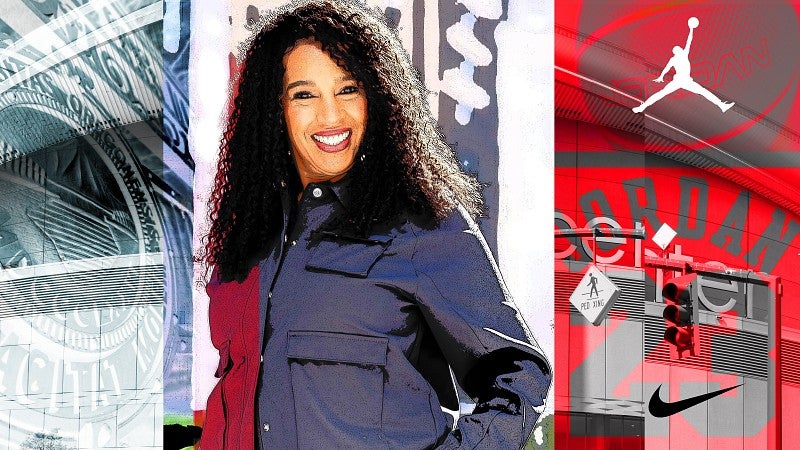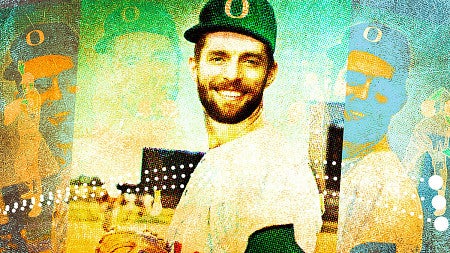
Navigating Change by Staying Her Course
Q&A with alumna Sarah Mensah, the first Black woman to lead Nike’s Jordan Brand
By Ed Dorsch • Photo illustration by David Gill • April 3, 2024
5 min read
Sarah Mensah, BA ’87 (telecommunication and film, journalism), ran track for Aloha High School, just a few miles from what is today her new office at Nike World Headquarters in Beaverton.
After graduating from the University of Oregon, Mensah aspired to become a broadcast journalist. She interned with Portland’s KGW-TV and tried on different hats before landing in sales. Then the Portland Trail Blazers called.
Starting in 1993, Mensah rose through the ranks to become the first Black woman to serve as an NBA team’s chief operating officer and the highest-ranking female staffer in the league. She helped the team navigate financial and reputational challenges, reinvigorate its brand, and boost attendance and revenue.
Mensah joined Nike in 2013, sprinting past milestones for Black women: first to lead one of the company’s four geographies, first as vice president at Nike North America, and—starting last June—first to head Jordan Brand, a sneaker and apparel juggernaut that generated more than $6 billion in revenue last year.
Oregon Quarterly caught up with Mensah to reflect on Nike, success, her years at the UO, and staying true to yourself.
OQ: What does it mean to lead Jordan Brand?
Sarah Mensah: It’s a full-circle moment for me on multiple levels. When I started at Nike, I started with Jordan Brand. But I never imagined I would one day be leading it. I grew up half a mile from Nike World Headquarters, which was then a field with ducks. It’s incredible to come to my office to lead this extraordinary global Jordan Brand where I used to play in my rain boots.
OQ: What’s your advice about success?
SM: It’s not linear. There’s a possibility for myriad twists and turns—things you’re not going to see that are around the corner. Stay true to your core purpose. What drives you? What gives you energy, passion, and excitement?
When you do that, you can remain open to all the different opportunities—all the twists and turns that will be available to you over the course of your career. That was the spine that allowed me to enter many different professional iterations, from journalism to broadcast journalism, from sales to sports leadership, and then to Nike and ultimately Jordan Brand.
OQ: What was it like to attend the UO?
SM: I’m forever grateful for my experience at the University of Oregon. It felt like no topic was off limits. No idea was unworthy of consideration. We were exposed to a wealth of intellectual concepts as well as social challenges. Early exposure to the duality of cultural and intellectual innovation is an extraordinary foundation for how a young human approaches life.
OQ: What obstacles did you overcome as an undergraduate?
SM: In some cases, I was the only woman in the room. More often, I was the only woman of color. I had amazing professors and a rigorous academic experience. But I also learned to hold my own in a room where nobody looks like you or maybe there’s an assumption that you don’t necessarily belong—and then you succeed. That has been crucial to my overall career experience.
OQ: How have you managed to embrace authenticity throughout your career?
SM: It doesn’t come easy. From the time I was a little girl—and I think this is true for most people—I’ve noticed the world rewards you for coloring inside the lines. We all learn it early on: the more you fit in, the easier it’s going to be for you.
As a mixed-race girl growing up in Oregon in the 1970s and ’80s, I had to develop a monologue and tell myself I had something worthy to contribute. I’m thankful for my parents, coaches, and the role that track played in my life. Competing helped me form that understanding of “Hey, it’s important for you to be unabashedly yourself and show up—at the table, during the meeting, in the world.” To use your voice for anything other than that sacrifices the gift.
There have always been people in the room telling me that I ought to color within the lines—and fall in line. But I’ve developed an ability to resist that.
OQ: What are common threads that run through the history of the UO and Nike?
SM: At the UO and later at Nike, Phil Knight and Bill Bowerman thought about athletes, how to create different systems to support them. I’ve experienced it at both places: an incredible sense of possibilities and new ideas. As Ducks, we fancied ourselves as responsible for pushing the envelope. How can we think in new ways and cross disciplines? That’s part of the university’s—and Nike’s—DNA.
OQ: How does a brand transcend shoes?
SM: Jordan Brand is one of the most inspirational brands in the world—possibly the most inspirational. It’s about greatness. For communities across the globe, it reflects how within every human being there is a seed of greatness. All we have to do is figure out a way to tap into that and unleash the Michael Jordan inside of every human being. Black Americans in particular have taken initial ownership of Jordan Brand as a beacon of hope.
OQ: You’ve always been willing to learn new things. At KGW-TV, you got into sales because you were interested in the business side of journalism. Then you continued learning as you took on more responsibilities with the Trail Blazers and Nike. What’s the value of curiosity?
SM: Curiosity is critical for anyone who’s leading teams or an innovation agenda. As soon as you’ve got it all figured out, business—and life—shows you otherwise. Jordan is a big brand that’s fairly mature. It’s gone through many successful iterations because we stay curious, humble, and hungry. We remain open to the possibility of doing things differently.
Update: Sarah Mensah will deliver the 2024 University of Oregon commencement address. To learn more, read the Around the O article.
Ed Dorsch, BA ’94 (English, sociology), MA ’99 (journalism), is a contributing editor for Oregon Quarterly.



